

As I hinted at in my previous article, I submitted more than a few questions to Strange Loop studio head and Eco lead designer John Krajewski. He’s been a busy man, promoting the game on the Kickstarter comments section, news sites, and even interacting with a few fansites, not to mention social media. Oh, and probably working on the game. However, as the Kickstarter draws near it’s final days, it’s time to reveal some of the gritty detail about the game you were too afraid to ask him yourself!
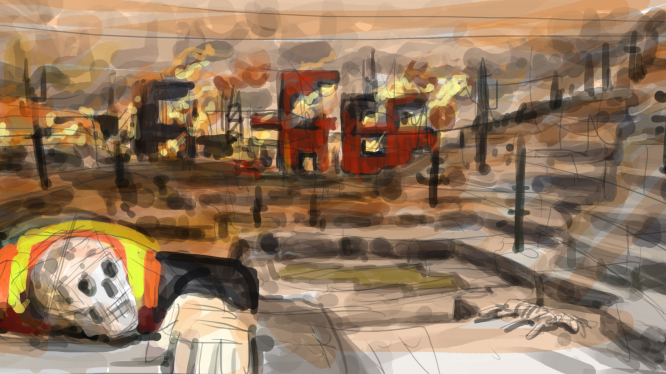
Sounds a bit weird for a heading, but bear with me. Certain games, like Wizardry Online, had systems in play that took the sting out of permadeath. Stats might carry over, you had a closet in your bank that would pass certain items down to your next of kin, etc. You don’t have that in Eco. “Death is permanent in Eco; your character is deleted.” No inventory items, no buildings, no nothing. In fact, Krajewski noted that “permadeath may mean you can’t make a new character though; that’s something we’ll decide.”
Only real-world knowledge lasts, such as knowing how to play the game, connections to friends, etc. “The challenge of [Eco] is collaborating with a group, and the process of gaining skills and doing research will happen each time, but be very different because it’s a different world with possibly different people, different laws, economy results, etc. It should feel really different each time, and the right political decisions will be different each time and will take some serious understanding and debate.” On the one hand, it makes Eco seem like a board game, or the “dying worlds” idea from Crowfall without the persistent world there to glue everything together. Everyone can start fresh together. On the other-hand though, it could make replay value lower for people who want something more persistent. People like measuring their progress, and a total loss of their character might be difficult to swallow.
There is some good news though. For one, at the moment, “only the meteor and starving (which takes a very long time)” kills players. “You won’t drown normally in the game, only in the special flood scenario.” Remember, in my last article I noted that Krajewski’s mentioned that, “If you get attacked by animals, fall, or starve you’ll just be very low health until you nurse yourself back to health with food and rest, or other players that can treat you with specialized skills, but you won’t die (you won’t be able to do any work though at that level of health).” Interestingly enough, dead bodies are generally “integrated back into the ecosystem over time, and scavengers can get food from them. They “shouldn’t cause a large amount of pollution.”
However, “meteors will be 30 days by default, but can be scaled.” That’s a bit worriesome for me since I find that the official servers usually have the most active communities, but servers get wiped at about the same rate in other survival games, so I’m already feeling as if I may want to opt for a private server. However, “if you survive the meteor, the server will live on, and you get endgame content we hope to build like visiting other worlds. Other disasters will appear periodically too.” That could be quite a saving grace. Krajewski assured me that end game is in the works for sure, now that the game’s been funded.
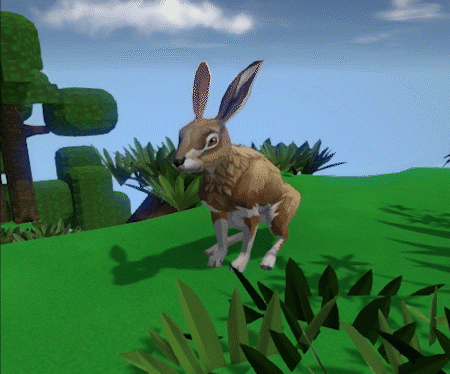
Personally, one of the first things I noticed about the game was it’s a survival game that didn’t once mention PvP. While there are other survival games that have a PvP off option, I usually feel it drastically alters the game in a way that makes it obvious that PvP is the main content. When I asked Krajewski why he wanted to build a PvE focused survival game, he said PvE “makes the PvP that much more meaningful, when you have a shared goal you’re working towards,” and I realized that’s exactly what most survival games are lacking.
For example, in Darkfall, you might make friends with someone fighting a certain monster because if you solo gank them, you then have to worry about them coming back and doing the same to you. However, “spawns” in, say, Rust, didn’t seem static enough, or at least, if they were, they were delayed by quite a bit. Even then, a single person could often, quite safety, take care all the mobs themself with a bow and arrow, one of the weaker weapons in the game.
However, the other interesting thing is that you don’t have to worry about fellow players directly killing you. Weapons do have a strong purpose in the game, such as rockets to deflect the meteor (Krajewski joked that “you can craft a Bruce Willis to send up there to deal with it”), but mostly, they’re for hunting. “For the criminal justice system, you’ll be able to subdue other players with weapons as well” and Strange Loop “may experiment with [harming players] in the criminal justice system task,” but at the moment, regular, law abiding players will be unaffected by weapons. You can’t even robbed in your sleep, so the only time you need to fear players is if Eco makes it’s PvP stretch goal and can add the optional criminal justice system, which (only when the server host switches it on) allows people to break laws, allowing for a criminal flagging system complete with witnesses, forensics, arrests, and even capital punishment.
That doesn’t mean the game’s all about picking flowers. While the game’s partially inspired by Minecraft and the Civilization series, it’s also inspired by Ultima Online and Eve.
Instead of traditional combat, the game’s PvP system utilizes “data, debate, and public forum.” Players can access data in a panel or with an offline tool, and “each law will have a thread of comments and counter arguments, with attached data.” Krajewski expects “some rich discussions and experiments in these law discussions,” and notes that players “can comment on the law for its lifetime, which may include later repealing it.” However, much like in real life, PvPers try to game the system, and I’ve noticed in comments that people doubt Strange Loop can protect their game from problems that have plagued other survival games (or even games that, in general, expect players to play nice together).
For example, there’s hackers, a problem with just about every survival game currently on the market (though, admittedly, they’re all still in alpha or beta). If one thing ruins this genre more than anything else (including griefers), it’s hackers. However, unlike most games, “people can host their own private servers, so you can whitelist people, but since the game will have shared source, the dev community can help [Strange Loop] bullet proof the servers and prevent hackers.” It’s not perfect, but it’s I feel like I’ve rarely seen a developer trying to push.
Then there’s griefing, the other big problem (feature?) in survival games. I expect to die a million times, but since people can just log into a server, mess with people, and then change servers to escape any retribution, I never feel like they’ll get their just desserts, unlike old school MMOs where you were tied to a character and server that existed without instances, putting you at the mercy of community blacklists. Sadly, Eco doesn’t have any kind of reputation system. “Each server will be a ‘fresh start’ for the players,” but Krajewski added that “perhaps we will bring across statistics about the players so you can see their past records,” though they would probably make it something the player chooses to display, so they can try different play-styles.
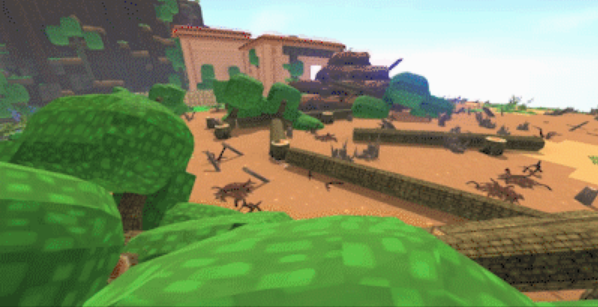
Instead of punishment (aside from permadeath and server banning via the justice system), Eco is opting for more of a griefing prevention approach. For example, on a brand new server, unless a new player’s paid for dozens of characters/accounts, dooming the world by cutting down trees to make them extinct and destroy the world will be rather difficult. On a fresh world, players will have “relatively few abilities.” The players “get sophisticated tech later in a server that” could be used to “chop down everything, but by then there’s been a chance for the government to evolve to a point preventing that. [Player] laws will evolve with your ability to impact the world, starting from scratch on both accounts.” That literally puts a financial burden on the griefer in order for them to get to griefing, something Strange Loop even emphasized with a recent Kickstarter tier. It’s not perfect, but feels better than the usual “anyone who bought the game can ruin my 10 hours of work within minutes.” Also, recall that, for now, laws are world wide, so griefers need to find the right server in order to grief- something that moved quickly enough in tech but lagged behind in law formations.
There are other issues to fear though. Powerful characters in the hands of griefers often make flaws in the game stand out even more, such as Darkfall Online not having any sort of skill cap. Sadly, Eco is also going without a cap. While you can only have character per world (unless, of course, they buy multiple accounts), skill ups are time restrained. While a recent update on survival covered skill gains and their connection with food, Krajewski gave us more details about the overall skill gain system, noting that gains are continuous, “even when you’re offline, as long as you’re well fed, with food covering various nutrients, so you’re also food-limited as well. Your character will eat while offline automatically to stay full and continue gaining skill,” but that does mean there’s potential for super skilled lumberjack miners who can craft anything in the game and are free to act as they see fit, without worry of being ostracized. We’ll just have to see how the skill gains work at launch before we draw any conclusions.
Finally, I have to note something that’s quite important to me personally: the game will not have integrated voice chat. I feel this is a great decision because it’s ruined my experience in a lot of other survival games. It pushes people onto you even more than the usual PvP system. It puts people in your house and you in theirs, and while you’d expect that it would mean people will be more polite, you’d be very, very wrong. Since this game’s pushing for education, I feel the slower pace is better. Heck, it’s been argued that slowing down parts of online games helps to rehabilitate problematic players. Forcing a player to type means they have more time to consider what they’re saying or how to react to another player, which can be empowering for more sensitive players. In short, this seems like it gives Eco the ability to attract and retain the kind of players I’m probably more used to in MMOs than the usual survival games.
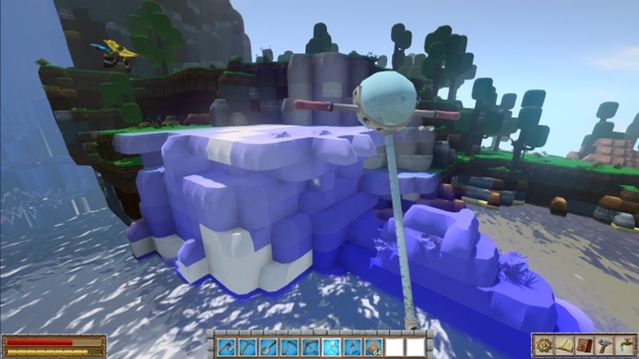
In recent days, we’ve finally gotten some more details on systems we’ve already heard of. The most recent reveal about pollution gives us a lot to think about, but it’s just the tip of the iceberg. While there were some good details, such as players being able to get sick from eating polluted plants or animals, Krajewski told us that “players can lose nutrition from eating polluted stuff,” which affects “their skill growth.” Pollution doesn’t just poison you, but kills plants, reduces the food supply, since animals that eat polluted plants can die from poisoning. “This will happen over time, so its not instantly destructive.”
However, one big thing I was curious about was the game’s crafting. We’ve received a nice update about it in the most recent reveal, but Krajewski gave us some great details on how the game handles it in a unique way:
“So crafting is very different than in other games; you don’t have a grid. Crafting is done through buildings, and they can be custom to players. For example, the game may state that you need a building with X cubic meters of volume, Y rooms, and made from material Z, with energy sources providing W energy. You can construct that in infinite ways, and when you do the server detects it and gives you the benefits of the building. Thus buildings are far from aesthetic in Eco, they have real gameplay purposes.
The skill of the creators of the building, and the size of it, will determine the efficiency of whatever ability it unlocks.”
This is really appealing to me, since as much as I love crafting, I’ve always felt weird about being a super blacksmith. I also tend to prefer to build something big, like bridges and houses, which are mostly just for looks in other MMOs. In a way, this system reminds me a bit about some of the crafting in Star Wars Galaxies, though perhaps a bit more simple in function, but more flexible in ascetic value. We’ll just have to see how it goes during October’s testing phase.
In previous Q&As, when talking about the process of building, one thing that was mentioned was transporting goods, and that it was done via animals. There is taming in the game since certain backer tiers get a hare or wolf pet (“hare pets can get eaten; keep them safe”). the game will also “have other labor providing animals that can be domesticated.” They won’t exactly be tamed, “but similar.”
Finally, for our non-English speaking friends, there’s a little bad news: Strange Loop only works in English. However, the company is asking the community to help with translations, so if that sounds like you, you may want to hit the the contact section of their website.
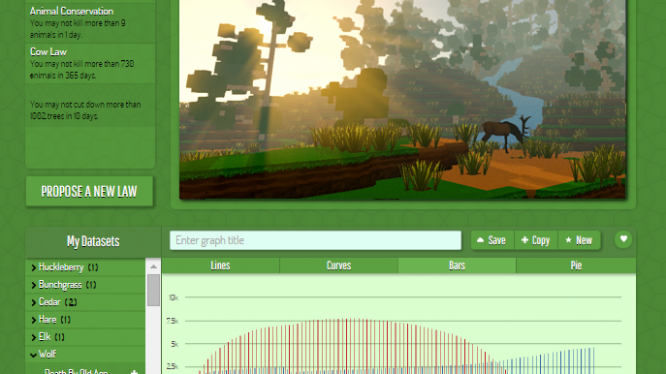
In a way, Eco‘s already been made. It got a grant from the US Department of Education’s Institute of Education Sciences after the proto-type was tested in schools. The Kickstarter’s basically to add a more consumer friendly angle to the game and to expand it’s audience, and it seems to have worked. We’re already seeing some thing that certainly don’t seem very classroom friendly.
For one, there’s the ability to play Eco as a single player game. “It will be very slow going,” and “you’ll basically have to disable the meteor, or make it very far off in time. If you’re hosting your own server though, you can fast forward time, so you can jump ahead like that.” On the other hand, Krajewski has laid out plans for multiple societies and regional laws should the game make enough money, so people who want a bigger game might be attracted to that. Also, while the game already has a little bit of work done on it’s aquatic zones, but more funding would help the devs “flesh out the underwater ecosystem.”
The game doesn’t need single player, underwater expansions, or regional/multi-societal conflicts for it’s educational goals, but it helps make it seem like a better buy for gamers. As well, while the current system is more than serviceable, additional funding could help with AI, such as including “nesting and habitats, something animals need that is really affected by player activity,” which would help with the educational side of things.
This is all really just the beginning though, as the Kickstarter’s still got a few days left as of this writing. I’d like to thank John Krajewski again for answering so many of our questions and being quite forthcoming about Eco!
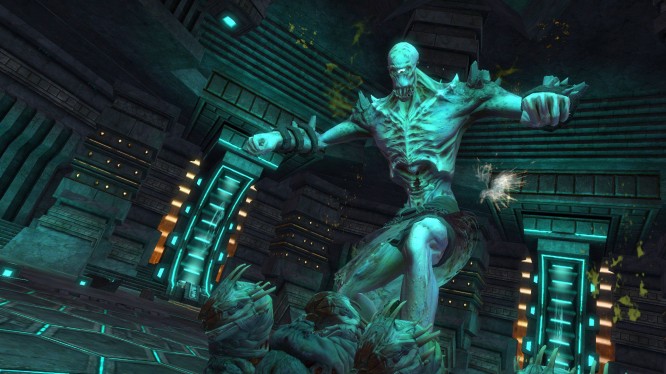

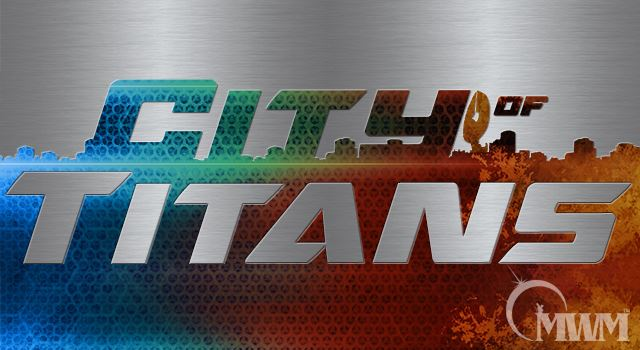
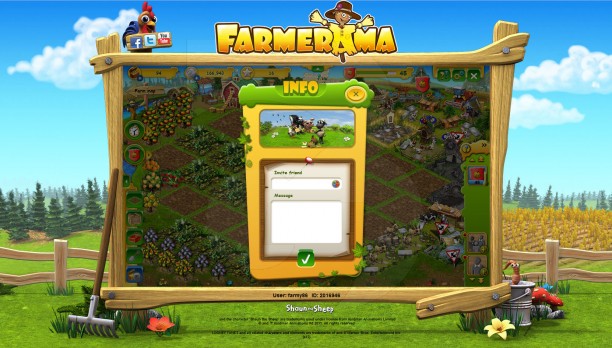
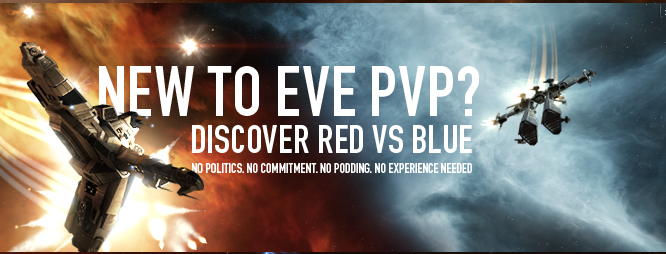 The Final Frontier: Getting Blown Up in Red vs Blue .
The Final Frontier: Getting Blown Up in Red vs Blue .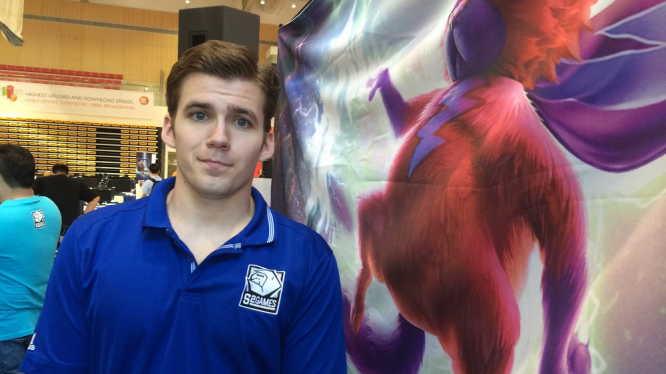 Strife Interview .
Strife Interview .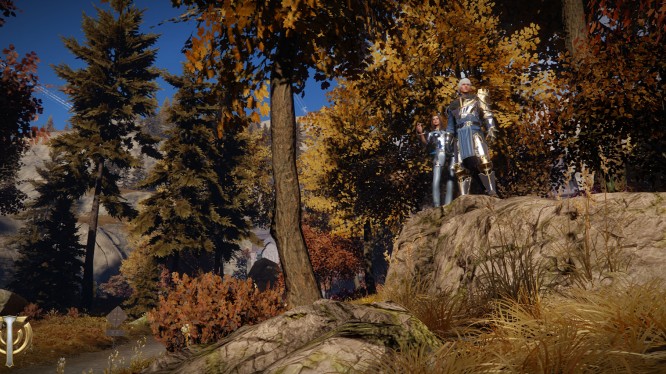 Skyforge Exclusive Interview and Screenshots .
Skyforge Exclusive Interview and Screenshots .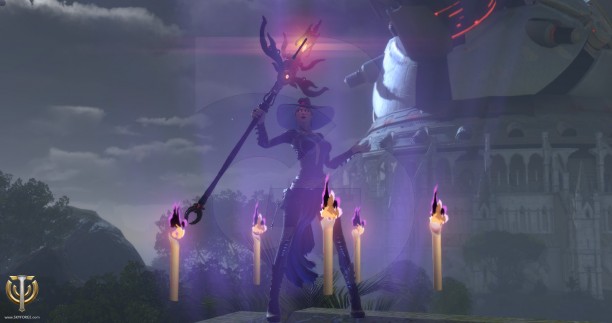 Skyforge: Meet The Witch Just in Time for Halloween
Skyforge: Meet The Witch Just in Time for Halloween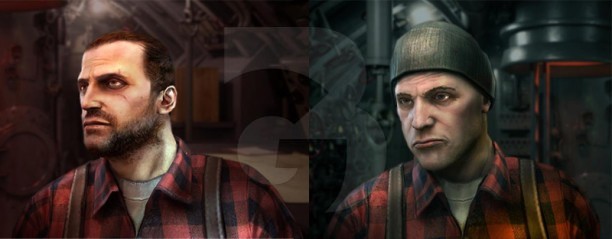 Silent Hunter Online: Learn the Tasks of Your U-Boat Officers
Silent Hunter Online: Learn the Tasks of Your U-Boat Officers